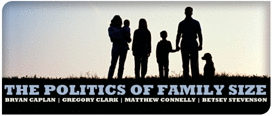Bryan is gracious in admitting he may have underestimated what we might have to pay people to have more babies. So how much more would he be willing to pay? Given that his policy would only apply to taxpayers, might hedge fund managers with large families get a free pass? And would this not mean doubly penalizing working class couples unable to bear children? But my main concern is the unanticipated costs and risks—inevitable when we are fiddling with something that we do not really understand—including the opportunity costs of implementing such a plan when the country has far more pressing concerns than the fertility rate.
When I wrote that I did not know how to compare the crimes of anti-natalism to the crimes of pro-natalism, I was drawing a contrast with Bryan’s assertion that the former have swamped the latter. I should have asked how he made this judgment, especially now that I understand he recognizes that threats to reproductive rights are ongoing. People struggle to compare the great human rights atrocities of the 20th century, but at least we can count the bodies. How do we even begin to calculate the toll on women’s health and wellbeing of having to bear children against their will, and then compare it to the tragedy of others who were denied that right? Historians shy away from making these kinds of judgments since we believe it is hard enough simply to understand and explain, and real understanding is what we need most to avoid repeating the same errors.
Bryan and I must agree to disagree about whether fertility is a good in and of itself “all else equal.” Ceteris paribus can be a useful—though often misleading—assumption when positing causal relationships. But it is not helpful when we are trying to assess human values. Most people judge liberty, prosperity, and health to be good in and of themselves because they wish to live in a society that maximizes each one of them. Who wants to live in a society that maximizes fertility, especially if manipulating or pressuring couples to have more children comes at the cost of liberty, prosperity, and health? When it comes to fertility, other things have never been equal—especially not the costs and risks for men and women, rich and poor, the fit and the “unfit.”

